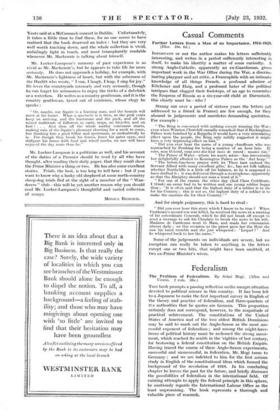Casual Comments
Further Letters from a Man of no Importance, 1914-1929. (Bles. 10s. 6d.)
IMPORTANT or not the author makes his letters sufficientl) interesting, and writes in a period sufficiently interesting in itself, to make his identity a matter of some curiosity. A strong Anglo-Catholic, apparently an ex-Guardsman, given important work in the War Office during the War, a discrim- inating playgoer and art critic, a Francophile with an intimate knowledge of all things French, a profound admirer: of Kitchener and Haig, and a profound hater of the political intrigues that clogged their footsteps, of an age to remember the Empress of Russia as a six-year-old child at Darmstadt, this clearly must be—who ?
Strung out over a period of sixteen years the letterS (all addressed to a friend in France) are few enough, for they abound in judgements and anecdotes demanding quotation. For example :
"The King is concerned with nothing except winning the War ; even when Winston Churchill casually remarked that if Buckiniham Palace were bombed by a Zeppelin it would have a very stimulating effect upon the people, the King only mildly suggested it might have a very depressing effect on him."
"Did you ever hear the name of a young chauffeuse who was reproached by Pershing for being a quarter of an hour late. Et VOUS, men Ginera/, vans ave.: dix-huit mote de retard ; nacmtez vite."
"The Prince of Wales—whom his aunts adore—has irreverently but delightfully alluded to Kensington Palace as the 'Ant heap.' "The before-luncheon prayer with its 'Thou hest endued- thy Servant Alfred with many excellent gifts,' "Sm., has set folk talking whether Northcliffe is a little off his balance, as he is supposed to have drafted it - it was delivered through a stentophone, apparently so that the Almighty should not miss a word of it.'
"For one of the exams, the other day (2nd Class Certificate, I think) an essay had to be written and one young soldier began thus : , It is often said that the highest duty of a soldier is to the for his Country ; this is not so, the highest duty of a soldier is to make the enemies die for their Country.'"
And for simple poignancy, this is hard to rival :
"Did you ever hear this story which I know to be true ? When Castlenau's second son was killed, he received the news at a meeting of his subordinate Generals, which he did not break off except to send a message to ask his Chaplain to break the news to his' wife. Madame de Castlenau went to Mass, and made her communion almost daily ; on this occasion as the priest gave her the Host she saw his hand tremble and she just whispered : Lequel ' And he whispered back to her the name."
Some of the judgements on individuals are severe, but no exception can really be taken to anything in the letters except one or two hits, that might have been omitted, at two ex-Prime Minister's wives.














































 Previous page
Previous page